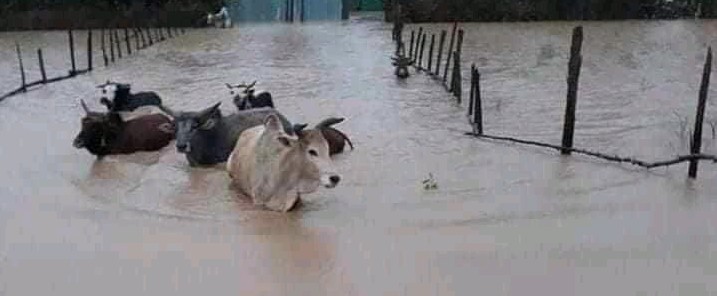Massive floods leave widespread destruction, displace 140 000 people in Afar, Ethiopia

More than 240 000 people have been affected and 144 000 displaced as widespread floods hit Afar, Ethiopia, the government stated in a press release on September 21, 2020. More than 80 localities have been hit in what authorities described as the worst flood the region has ever seen. Floodwaters left up to 41 000 ha (101 300 acres) of crops damaged and at least 21 000 animals perished.
Afar Regional State Disaster Prevention and Food Security Bureau Head, Mohammed Hussein told the Ethiopian News Agency that 240 000 people have been impacted by major floods, and the state needs 350 million birrs or around 9.5 million dollars for relief and rehabilitation.
So far, only 100 million birrs or 2.7 million dollars have been collected.
"Even if the regional and federal governments, as well as different organizations, have been supporting the displaced persons surrounded by water, the assistance provided is still insufficient," Mohammad noted.
He added that the region has been battered not only by flooding, but also by desert locust invasion and the COVID-19 pandemic, resulting in a lack of medicine, clean water, and shelter.
This is what happened in Afar region, Ethiopia. People in afar region has heavily affected by flood. But our prime minister hasn't eye to see this poor people and ear to hear them. And the government media's are not giving enough media coverage!!#UN#UNCHR pic.twitter.com/ap3Mf1eFCm
— Obsaa Official (@ObsaaOfficial) September 14, 2020
Intense flooding in Afar after a heavy rains pounded the area is creating a Humanitarian & Animalitarian catastrophe.
Urgent response needed to evacuate families displaced by floods.
pic.twitter.com/pXCLCI1d8r— ኮንፊሽየስ (@EmanuelHabtamu) September 14, 2020
People In Afar Is Suffering of Mid Flood .#LetsVoiceForAfarPeople#TheySeekHelp pic.twitter.com/Wt7NBDalAt
— Biqilaa (@bikila_tefera) September 14, 2020
Kesem, Tendaho, and Koka dams on the Awash river overflowed, displacing more than 144 000 citizens. About 41 000 ha (101 300 acres) of land were also ravaged, while more than 21 000 animals perished.
More than 80 localities have been inundated, with authorities describing it as the worst ever the region has seen.
More than 1 000 people were stranded, at least 48 000 lost their homes, and around 123 74 are in need of emergency food assistance, while another 84 000 people composed of mothers and children are in need of medicines.
Mohammed urged the government and relevant organizations to extend further help to address food shortage.

Featured image credit: @EmanuelHabtamu

Commenting rules and guidelines
We value the thoughts and opinions of our readers and welcome healthy discussions on our website. In order to maintain a respectful and positive community, we ask that all commenters follow these rules.